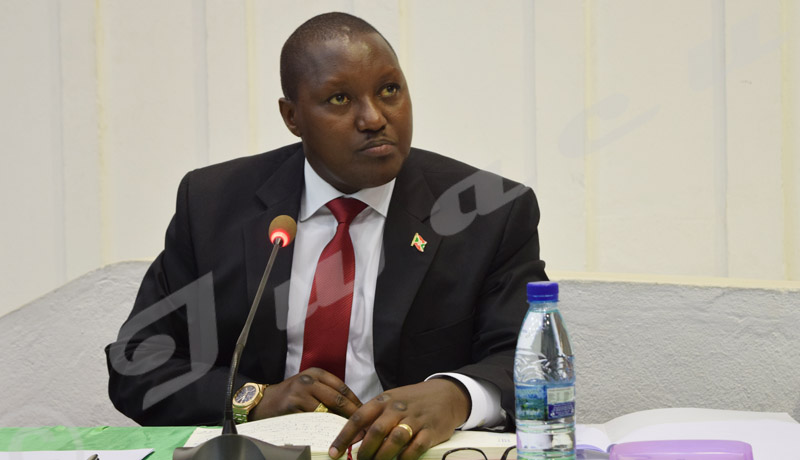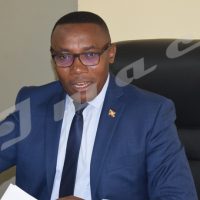Burundi has been on a diplomatic offensive since 19 February. It wanted that the decision of the AU to withdraw 1000 Burundian soldiers from AMISOM be revised. With the support of the Somali president, Bujumbura engaged in fighting a losing battle.

Emmanuel Ntahomvukiye: “It is an unfair and unilateral decision.”
A calendar was clearly established. From 28 February, 1,000 soldiers of the Burundian contingent of the African Union Mission in Somalia-AMISOM were supposed to have packed up and left Somalia.
However, only 400 soldiers returned. Bujumbura engaged in a showdown against the African Union following its decision.
For the Minister of Defense, Emmanuel Ntahomvukiye, the decision was “unfair” and the government would not let itself be a pushover. A verbal note to protest the decision was sent to the African Union.
600 Burundian soldiers had remained in Somalia. The commander of AMISOM, for his part, said he followed the orders given by the African Union.
This decision was taken by the African Union Commission, which, On 19 December , sent a correspondence to the United Nations Support Office in Somalia (UNSOS).
“Burundian troops of the African Union peacekeeping force in Somalia will be reduced by 1,000 by the end of February 2019,” reads the correspondence.
The AU bosses said they were only implementing resolution 23-72 which was unanimously adopted by the Security Council in 2017.
The members of that council decided to extend the mandate of AMISOM and gradually reduce the number of troops deployed in one of the countries of the Horn of Africa until 2021.
Burundi, for its part, protests against this decision. ” The troop contributing countries in Somalia had agreed to withdraw the troops in the same proportions, “said the Defense Minister.
On November 30, 2018, the 27th meeting of the Military Operations Coordinating Committee of AMISOM held a meeting to see how the military personnel of this peacekeeping force in Somalia should be reduced.
During that meeting, as in the other one which was held on August 27th by the Operations Coordination Committee, it was not stated anywhere that only Burundi would withdraw its troops. Each contributing country had to withdraw a portion of its troops. Contributing countries, the Somali delegation, the AU delegation and partners such as the European Union and the United States were present.
“It’s an irrevocable decision”
Burundi currently has the support of the current President of the African Union and Somalia. President Mohamed Farmajo paid a two-day visit to Burundi and met with his counterpart Pierre Nkurunziza.
At the end of their meeting, the two presidents called for an urgent summit of the heads of state and government of the troop contributing countries of AMISOM. The aim is to ask the AU to review its decision.
“It’s an irrevocable decision, replied Smail Chergui, the boss of the Peace and Security Commission of the AU.
Why did the African Union decide to reduce the number of Burundian troops only and break the agreement established by the troop contributing countries?
The African Union would have been under very strong pressure from the European Union, the funder of the African Union Mission in Somalia-AMISOM.
That pressure is not new at all. First, sanctions were imposed by the EU in March 2016 by freezing the financial direct aid it used to give to the Burundian government.
The EU would have been seeking to close the country’s remaining sources of currency. It is the EU money that was used to pay the salaries of Burundian troops engaged in AMISOM.
Burundian soldiers spent more than 11 months without being paid. The African Union did not give in. It took a stand in favor of Burundi and asked the EU to treat the Burundian troops in the same way as the other contingents.
At the time of going to press, a high-ranking Burundian official told AFP that a second phase of withdrawing Burundian soldiers from AMISOM “would begin on Sunday according to a new schedule agreed with the AMISOM High Command”.
Analysis by Guibert Mbonimpa
The logic of clash gives way to the quiet force
The withdrawal of 1,000 Burundian soldiers from AMISOM will be the first defeat of Bujumbura in its logic of clash characterized by the unpredictability of attack.
The National Assembly joined in by issuing a statement on Friday, February 22, urging the executive to consider “where appropriate”, the withdrawal of “all Burundian troops” from AMISOM, in retaliation for an “unfair and unilateral” decision.
The communication clash reached its boiling point with the letter from the commander of the Burundian contingent to the boss of AMISOM. It states that Burundi must withdraw only 400 soldiers and that other troop contributing countries must do the same. He told him that he will now receive orders from his superiors in Burundi.
This logic of “seka” (smash) had always been successful since the outbreak of the crisis in April 2015, to date. Bujumbura was able to keep “the coup plotters and terrorists” out the negotiating table without any difficulty.
And its participation in the Summit of Heads of State of the EAC on 1 February – after boycotting that of November 30, 2018 –would make some believe that playtime was over as the correspondence of President Museveni in reaction to that of his Burundian counterpart would still predict.
Bujumbura has given in to the AU Commission.”Pierre Nkurunziza totally lost the battle against the AU Commission and decided to step back after realizing that he had no regional support among the troop contributing countries,” an African diplomat told AFP, on condition of anonymity.
The wisdom of Sun Tzu, the Chinese military strategist of the 6th century BC, finally won: “If your enemy is superior in strength, avoid him! If he is temperamental, irritate him. If you’re just as strong as him, fight. Otherwise, avoid the fight and make a reassessment. ”
Story written by Agnès Ndirubusa and translated into English
by Pierre Emmanuel Ngendakumana



















 IWACU Open Data
IWACU Open Data

